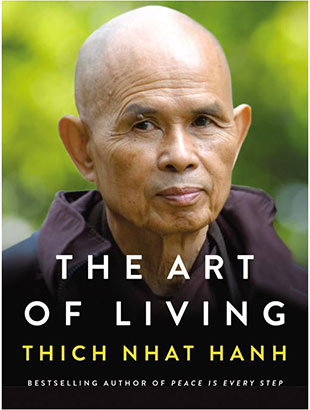Thich Nhat Hanh, or Thay (teacher in Vietnamese) as his friends and students call him, is a world-renowned writer, spiritual leader, scholar, poet, peace activist, and Buddhist monk. He was born in Vietnam in 1926 and became a monk at the age of sixteen.
He is a master of the art of mindful living and staying in the present moment. His practice of engaged Buddhism has led to the transformation of many people’s consciousness, and his writings on dealing with anger and violence are very concrete, recommending specific practices to undertake in our families and communities. Another of his core teachings — being peace in this conflicted world — has led many to new respect for their enemies and a firmer resolve to bring about reconciliation in our tattered world.
In this sturdy and enlightening work, Thich Nhat Hanh explores seven key meditations. There are the Three Doors of Liberation, recognized in every Buddhist school: emptiness, signlessness, aimlessness. Four other concentrations are found in the Sutra on the Full Awareness of Breathing: impermanence, non-craving, letting go, and nirvana.
He believes these practices represent "the Buddhist vision for a global spirituality and ethic." At the same time, they are nonsectarian and universal: "All spiritual traditions have their equivalent to these trainings, which are not commandments but practices of compassion born from mindfulness and insight."
These fruitful trainings provide a path of happiness which enables us to touch peace and freedom each day in a variety of ways. In Thich Nhat Hanh's eyes, we are much more than our bodies — we are life without boundaries. With ample grace and abounding insights, this Zen master points to the eight bodies we all have been blessed with:
- the human body (it carries within it "the stars, the moon, the universe, and the presence of all our ancestors");
- the Buddha body ("our capacity to be awake and fully present, to be understanding, compassionate, and loving);
- the spiritual practice body ("all of the spiritual practices and insights that have brought me healing");
- the community body ("a source of support and a place of refuge");
- the body outside the body ("the ways our practices and actions are non-local and used by others);
- the continuation body (our words and actions that influence the world and have a long-lasting impact upon others);
- the cosmic body ("We are inside the earth, and the earth is inside us." and "In every moment of our life the cosmos is going through us, renewing us, and we are returning ourselves to the cosmos.");
- the ultimate body (beyond appearances and signs, the true nature of the cosmos, which cannot be described in notions, words, or signs).
We read with interest and were immensely impressed with Thich Nhat Hanh's writings on aimlessness and resting in God; impermanence and the futility of trying to live forever; and the art of letting go as a means of releasing our suffering.
We cherish Thich Nhat Hanh's constant emphasis on everyday spirituality. Here he is on a daily three minute ritual:
"The time of brushing your teeth is not lost time. It is also life. Don't just do it just to get it done. Enjoy being mindful, and concentrate on the act of tooth brushing. This is the art of living. You don't need to think of anything else; you don't need to hurry. Just relax and enjoy brushing your teeth. When you do this, you encounter yourself and you encounter your life deeply in the present moment."
